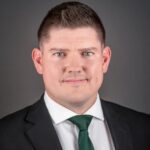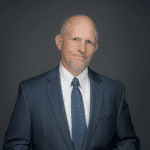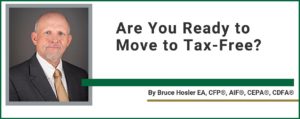Upon your passing, your estate could end up in probate. All your affairs will become public record, there can be delays on the paperwork, and there will, of course, be attorneys’ fees. Jason Hosler rejoins us today to talk about avoiding probate.
First, review all your beneficiary designations for all your bank and brokerage accounts. These designations are Payable on Death (POD) for bank accounts and Transfer on Death (TOD) for brokerage accounts. You want a primary, secondary, and tertiary beneficiary for each. And make sure everything is clearly documented!
In community property states, including Arizona, you can leave real estate to your spouse with a full step-up in basis, meaning they don’t have to recognize or pay capital gains tax on the property. But beware of the trap of retitling a home to your children – Jason explains the pitfalls here.
A living trust can also be an essential tool – not when you die, but when you don’t. Examples of this include any health incident or incapacitation that prevents you from running your own affairs.
Probate isn’t all bad. I explain some situations where probate may be the appropriate tool for your estate.
We wrap up by discussing digital assets. So much of our lives are now online. With that comes a whole new realm of access and documentation you must be aware of.
For more information about anything related to your finances, contact Bruce Hosler and the team at Hosler Wealth Management.
Call the Prescott office at (928) 778-7666 or our Scottsdale office at (480) 994-7342.
To listen to more Protecting & Preserving Wealth podcast episodes, click here.
Limitation of Liability Disclosures: https://www.hoslerwm.com/disclosures/#socialmedia
Guest Profile

Jason Hosler holds Series 7 and 66 FINRA securities registrations. He brings a technological edge to our firm and helps many of our clients stay current in the fast-moving age of the internet.
Podcast Host

Bruce Hosler is the founder and principal of Hosler Wealth Management, LLC., which has offices in Prescott and Scottsdale, Arizona. As an Enrolled Agent, CERTIFIED FINANCIAL PLANNER™ professional, and Certified Private Wealth Advisor (CPWA®), Bruce brings a multifaceted approach to advanced financial and tax planning. He is recognized as a prominent financial professional with over 27 years of experience and a seven-time consecutive *Forbes Best-In-State Wealth Advisor in Arizona. Bruce recently authored the book MOVING TO TAX-FREE™ Strategies For Creating Tax-Free Retirement Income And Tax-Free Lifetime Legacy Income For Your Children. www.movingtotaxfree.com.
In the Protecting & Preserving Wealth podcast, Bruce and his guests discuss current financial topics and provide timely answers for our listeners.
If you have a topic of interest, please let us know by emailing info@hoslerwm.com. We welcome your suggestions.
*2018-2024 Forbes Best In State Wealth Advisors, created by SHOOK Research. Presented in April 2024 based on data gathered from June 2022 to June 2023. 23,876 were considered, 8,507 advisors were recognized. Not indicative of advisor’s future performance. Your experience may vary. For more information, please visit.
Transcript
Jon “Jag” Gay: Welcome back to Protecting and Preserving Wealth. I am Jon Gay joined as always by Bruce Hosler. Bruce, I’ll let you introduce our third co-host today.
Bruce Hosler: Jon, today I’ve invited Jason Hosler, with Hosler Wealth Management, to join us to talk about avoiding probate problems.
Jon: Jason, you were here a couple episodes ago. Welcome back. Thanks for joining us today.
Jason Hosler: Thanks, Jon. Bruce asked me to join him today because we’ve recently had some questions from a client regarding pour-over wills.
Jon: All right. I am a caffeine addict. I’m a fan of pour-over coffee. I’m not as familiar with a pour-over will. If you would please give our listeners a 101 on it.
Jason: Well, it’s probably not as enjoyable as a good pour-over coffee but it might be a little bit more important. Pour-over will is used to help a client that’s got a revocable living trust, make sure that if they fail to properly title an asset into their trust, they can use that pour-over will and probate to get the asset moved into their trust after death.
Jon: Did I hear that right? The pour-over is going to have to go through the probate process?
Bruce: You actually did, Jon. I am fearful that many of our listeners don’t realize that if they don’t set up their affairs properly to avoid probate, they will almost, for certain, have to have their estate probated. For example, if you just have a will for your estate plan, then you’re guaranteeing that your estate will be subject to probate. Why is that? You may ask. Because any assets that transfer via your will, will be subject to the probate process.
Jon: Sounds like most people would want to avoid probate if they can. What are the negatives to probate, Jason?
Jason: First, probate is public. That means that there’s a public record from the probate court of what took place in your probate estate. Secondly, they can be delayed waiting on getting all the paperwork filed and processed through the court system.
Bruce: Probated estates of any size are almost guaranteed to have attorney’s fees in order to handle the probate process. When you set up your affairs to avoid probate, then you can avoid the delays, the public record, and much of the attorney’s fees.
Jon: All potential problems depending on the client. All right. You say “avoid probate,” Bruce. Jason, what are tools our listeners can use to avoid probate?
Jason: Well, first we want to identify all the accounts that use the beneficiary designations such as IRAs, 401ks, the accounts that can transfer your life savings after your death without big delays or cost. Using those beneficiary designations is very efficient and it doesn’t cost a single penny to set those up.
Jon: There you go. Share with our listeners some of these tools.
Jason: Well, the first place to start is that you want to review all of those types of accounts, IRAs, Roth IRAs, 401ks, pensions, SEPs, simple IRAs, just to name a few. You can also include insurance products, annuities, and life insurance plans.
Bruce: You can also set up your banks and brokerage accounts with a beneficiary designation. Not everyone knows about that. These are referred to as a POD, which is pay on death, and that’s used for bank accounts, or a TOD, which is used for transfer on death, and you usually use those on an investment brokerage account.
Jason: Here in Arizona, we also can set up an Arizona beneficiary designation for real estate if you don’t have a trust. It will affect a transfer to your designated beneficiaries for that piece of real estate avoiding probate.
Jon: Got it. What are some other steps our listeners can take to avoid probate?
Bruce: How you title your assets can control how the assets are transferred if you die. For example, in Arizona, which is a community property state, if you title your real estate community property with rights of survivorship, you can leave your real estate to your spouse with a full step-up in basis. That means that he or she could sell the property after you die and not have to recognize or pay any capital gains tax. It is a fantastic tax move.
Jason: We’ve also seen some people try to avoid probate the wrong way. We’ve heard of adult children persuading their mother to retitle the family home in joint tenancy with the children. This will avoid probate but it exposes the equity in the family home to the creditors of the children as well. If they were to get in a car accident or have unpaid creditors, maybe experience a business failure, or have to file for bankruptcy, it could cause mom to lose the house. This is not how we want clients to try and avoid probate.
Jon: That is scary. I’ve heard the people that own real estate can usually benefit from having a revocable living trust. Is that true?
Bruce: I think in general terms that if you own real estate, that a living trust makes a lot of sense for the majority of people.
Jason: One of the benefits of a revocable living trust is not what happens when you die but rather what can happen if you don’t die. What happens if you have a health incident or some other event that causes you to be incapacitated to the extent that you need someone to step in and handle your financial affairs? If you have a trust, that person is going to be your successor trustee when it comes to the assets you have titled in your trust. If you don’t have a trust, that person would have to be chosen and have a durable financial power of attorney.
Bruce: That brings us to a very important point. If you do have a trust, your successor trustee does not have power to access your retirement accounts on your behalf. Retirement accounts include IRAs and Roth IRAs. Only the person you have designated to hold your durable financial power of attorney can act on your behalf to access your IRA accounts if you’re incapacitated.
Jon: Geez. It sounds like this estate planning documentation is really important for each of us. I’m 42 but this is going to be true no matter how old we are.
Jason: It really is, Jon. We try and make sure our clients avoid making some of the classic estate planning mistakes in their efforts to avoid probate.
Jon: All right. This sounds like a good time to list out some of the most common probate mistakes that you gentlemen see.
Bruce: Yes. In fact, I just heard a story today. One of the representatives that calls on us from different companies that provide ETFs told me his story. He came to one of our presentations on trust planning and estate planning. He wasn’t doing anything, and then he had one of his fellow associates that was only a year older than him pass away unexpectedly and leave his widow, his new wife, without anything. That made him go and get his financial estate and his estate planning in order.
The first big probate mistake is not taking the time to do any estate planning and not having your estate planning documents prepared by an estate planning attorney that specializes in estate planning.
Jason: The second mistake that we see all the time is really titling mistakes. Holding title to the assets the wrong way. People will go and they’ll get a trust and then they won’t actually title any of their assets in that trust. For example, if you have rental real estate, having an LLC to limit liability can provide you some asset protection, and then you want to own that LLC inside of your living trust.
Bruce: Third, we want to make sure that we have properly documented beneficiary designations on all of our IRAs, annuities, and life insurance. That means using a primary, a contingent, and a tertiary beneficiary. We’ve talked about those before, but those designations are very important.
Jason: Fourth, I would say we want to make sure that you don’t fall prey to some of the wrong advice about titling your home and other assets and joint ownership with one of your children and accidentally make an unintended gift.
Jon: I’m sure, between the two of you, you’ve seen these mistakes and countless others. That is a really good list of things our listeners can do to avoid probate. It does make me wonder, is there a time that some of our listeners could actually benefit from probate?
Bruce: Jon, that’s a really good question. If you don’t have many assets, you may want to use a simple will along with the beneficiary designations we’ve discussed today to leave your assets to your heirs. It’s true, some of them may be subject to probate but you can use a simple will to leave your wishes. This is a less expensive way to go than paying an attorney to prepare a trust.
Jason: If you’re going to use a will instead of a trust, one of the important things you need to know is that you need to make sure you have it in writing and you keep track of the original document because if you use that will, your family will have to have the original when they try to probate your estate. A photocopy will not work.
Jon: Now that’s something I actually didn’t know. I bet a lot of our listeners did not know that either. You have to protect your original will. Where do you advise clients to keep that will?
Bruce: That’s a great question, Jon. You want to keep your will somewhere safe in your home where your family knows where it is and where it’s safe from flood and fire. A good place is a fireproof file cabinet or a fireproof safe if you have one.
Jason: Jon, that leads us to another big problem we’re seeing, and it has to do with your digital life, computer passwords, website passwords, access to all your digital assets that a lot of our clients have now. So much of our lives are now kept online. Folks should make sure that they provide their loved ones a way to access their digital assets. Think about it. You don’t need to die to need this access either. If you have a stroke or other major medical event, allowing your loved ones to help you requires access to this important information.
Bruce: Jason, I’m so glad you brought that up. We want to make sure our listeners are also aware of the new digital wills as well. Your attorney can prepare one for you and help you leave access to your digital assets for your loved ones when you become incapacitated or when you pass.
Jon: This has been a really interesting episode especially that stuff about digital at the end here because that is so important as more and more of our lives go online. We all are certainly moving more into the digital world. No one uses checks anymore. I know I don’t. It’s all credit cards, debit cards, and online. Each one of us experienced it even more since the pandemic. If our listeners have questions about any of the stuff we’ve talked about today, how do they reach the fine folks at Hosler Wealth Management?
Bruce: Jon, they can reach us at the website at hoslerwm.com or on the phone in Prescott at 928-778-7666. We’re in Scottsdale at 480-994-7342. Thanks guys for a great conversation today.
Jon: I’m going to go upstairs and check on where all my stuff is set because that’s important. Appreciate it, gentlemen. We’ll talk soon.
Jason: Thanks, Jon.
Bruce: All right. Thanks, Jon.
Jon: Securities and advisory services offered through Commonwealth Financial Network, member of FINRA/SIPC, a registered investment advisor. Forward-looking commentary should not be misconstrued as investment or financial advice. The advisor associated with this podcast is not monitored for comments and any comments should be given directly to the office at the contact information specified.
Any tax advice contained in this communication, including any attachments, is not intended or written to be used and cannot be used for the purpose of, 1) avoiding federal or state tax penalties or, 2) promoting marketing or recommending to another party any transaction or matter addressed herein. The accuracy, completeness, and timeliness of the information contained in this podcast cannot be guaranteed. Accordingly, Hosler Wealth Management LLC does not warranty, guarantee, or make any representations, or assume any liability with regard to financial results based on the use of the information in this podcast.
Comments are closed.


